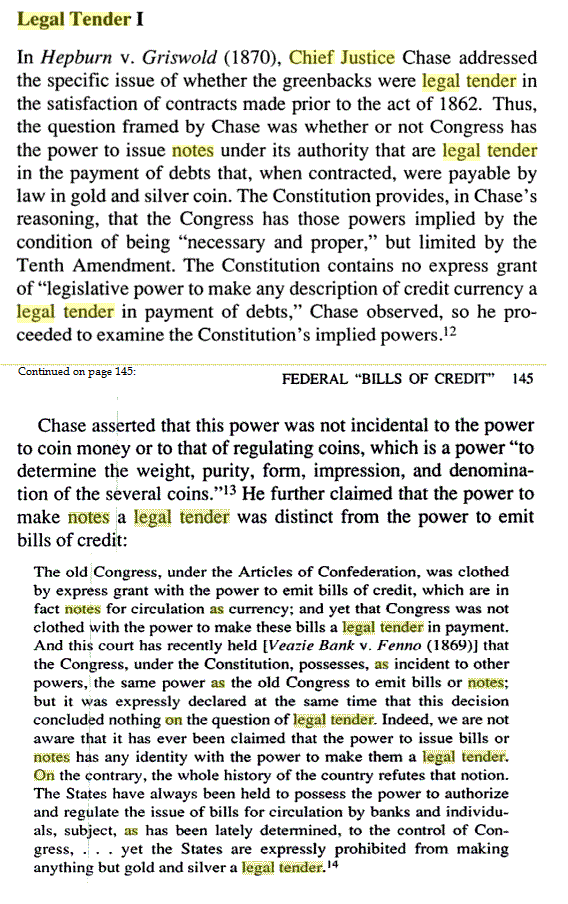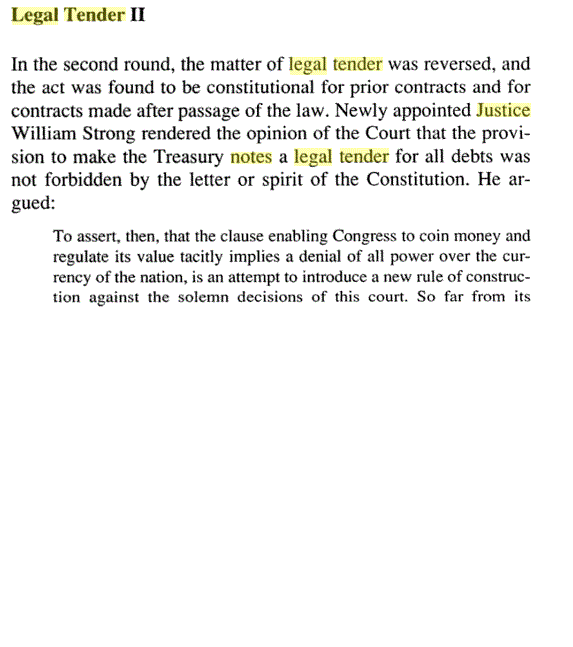This Post is wonky, so if you aren't a wonk like me, you might want to skip it.
To me it is obvious that if Congress has the right to regulate all forms of money, it has the right to declare it's "bills of credit" a legal Tender. To me this is obvious under Article II section 8:
- To borrow money on the credit of the United States
- To regulate Commerce with foreign Nations, and among the several States, and with the Indian Tribes
- To coin Money, regulate the Value thereof, and of foreign Coin, and fix the Standard of Weights and Measures
- To provide for the Punishment of counterfeiting the Securities and current Coin of the United States
To me it seems obvious. But SCOTUS has often said "hold your horses Charlie!" This post is about Chase and Grant's courts. Chase, as Treasury Secretary, was pretty much the father of the modern Greenback. But while he believed that the Federal Government had the right to create paper money. It appears he had doubts about whether the Federal Government could compel people to use it. i.e... to make it a "legal tender." It took Grant's court to make our Greenbacks a legal tender.
Doubts about the Power of Congress to make Bills of Credit Legal Tender
You'd have thought that if the Government had the power to "emit bills of credit" (paper money) they'd have had the power to make it "legal tender". At the present time this seems a settled issue, and Congress has even delegated that power to the Federal Reserve, which issues trillions of dollars in "bills of credit" without even bothering to offer apologies to congress, much less ask permission. Opposition to this is mostly relegated to wingnutville and conspiracy nut land. But it wasn't always that way. My friend Rick DiMare introduced me to this subject, but much of this comes from some books I was able to find, on the history, which verified what he was talking about.
Legal Tender and SCOTUS

SCOTUS took the fact that the power to issue bills of credit by the Federal Government was implied and claimed Congress had that power but not the power to make such notes legal tender!

Notes not Legal Tender?
Chase cites the Constitution forbidding the States! to make bills of credit a legal tender and then claims that the constitution denies that power to the Feds too!

And Chase explains:

Federal Notes are Perfectly Legal -- But cannot be forced on Merchants
Essentially Chase and earlier SCOTUS justices were saying that the Federal Government, and private banks, had a perfect power to issue "bills of credit" but they didn't have the power to force people to accept them as money! This assertion underminded the authority of the Government and it's abilities to regulate commerce, but to those who feared inflation from the printing of bills it made sense. If the Federal Government could force people to accept their notes they could undermine the value of the money supply and reduce the power and wealth of the wealthy. Chase Concluded:

Asserting US Sovereignty over it's Money Supply
Fortunately for us Justice Samuel Miller Dissented:

This dissent would become part of majority opinions with the Grant Court.

I can't find the scan of the title page for this and the Grant portion is poorly scanned. So I'm leaving out details. But The Grant Court overturned the assertion that bills of credit cannot be sovereign or declared a legal tender. The issue wasn't fully settled until almost the 20th century, because there was resistance from the "monied men" in accepting paper currency or any sort of regulation from the Federal Government. And also because of dissents by some Justices.

I posted this to provide source material for other matters.
No comments:
Post a Comment